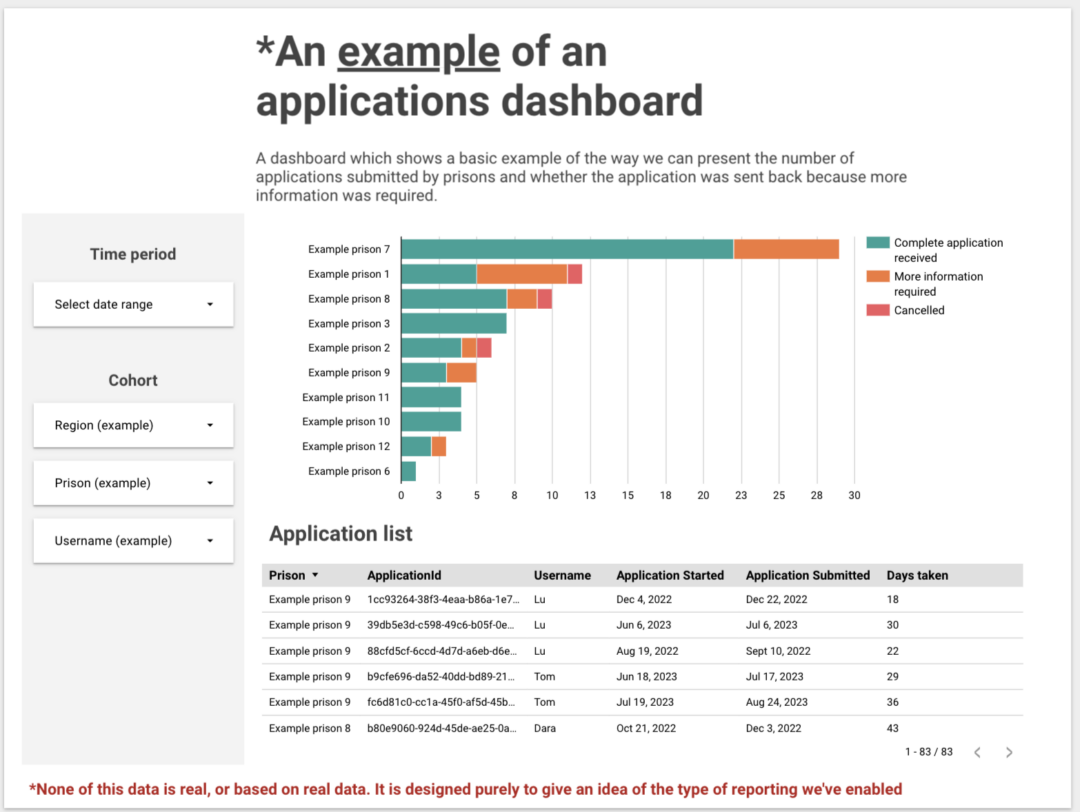Using data to help people leaving prison into short-term accommodation

Through better data we’ve been able to improve the applications service and give clearer focus to decision making
| 100 applications in 31 days | 21% more applications YoY | Reduced application assessment time by 1.5 days |
| Within 31 days of the private beta launch, 100 applications were processed. | There are 21%+ more applications being produced now than the same period last year. | The average time spent assessing an application was reduced from around 3d 17h to 2d 5h |
dxw has been working with the Ministry of Justice to build a product that improves the process of applying for short-term accommodation for people leaving prison, and gives senior stakeholders more data and insight into application activity. We’ve provided better data and used it to give clearer focus to our decision making about the service.
In 2022/23 the percentage of people housed on release from prison was around 86% (Source: Prison Performance Ratings).
Getting someone into accommodation significantly reduces their likelihood of reoffending (Source: HM Inspectorate of Probation), but until recently the process of applying for accommodation has largely been a manual one. This has made it difficult to monitor applications to housing providers, responses to applications, offers of accommodation and allocation of bedspaces.
Identifying what needed to change to improve the service
An in-depth discovery into the problem space led us to 3 key objectives:
- increase the number of applications
- improve the application processing time
- enhance the service and product data
These product objectives fed directly into the service objective of improving the existing occupancy rates for available accommodation.
Increasing the volume of applications
Our end goal was to increase good quality application volumes. The more applications made, the greater chances of matching people with the right accommodation. Leading to increased occupancy rates of available beds and more effective and efficient allocation.
Following a successful alpha, where user needs uncovered in discovery were developed into design concepts, tested and then built, the team moved into private beta.
The private beta phase involved 17 prisons, with a mix of women’s and men’s estates, privately and publicly managed prisons, those both familiar and less familiar with the service. Application volumes had been monitored weekly as part of the original process. In the 10 weeks following the private beta launch, application volumes were 21% higher than their previous year’s figure.
Using data to understand application processing times
The content of an accommodation application is largely made up of information already stored in other systems. In the original process, the person filling out the application would copy and paste information from other systems into a template. The length and complexity of these applications could vary a lot from person to person and it was difficult to understand how long this took.
Using API calls to the source systems, we now pull the necessary information into the digital application forms. This will reduce the time and risk of error that comes naturally with any manual copy-paste process. On top of this, we’ve made it possible to understand how much time an application takes. We’ve been able to surface the following:
- which questions are referrers spending the longest on
- the length of time it takes a referrer to submit an application after starting it
- the length of time it takes the receiving organisation to respond to a submitted application
- the length of time it takes to respond to a ‘request for further information’ (when applicable)
This has informed conversations on process bottlenecks, areas for training and further product features that may support more efficient processing of applications.
Building data visualisations to show trends
Weekly management information, supplied by the accommodation provider, was produced as part of the original process. Our goal was to improve both the level of detail of the data and the access stakeholders had to it. Pulling data into PowerBi (as the organisation’s tool of choice), visualised data on key themes daily. Individual application-level data was made available alongside aggregated data at a user, prison and regional level. We’ve mocked up an example, using lookalike data in Looker, below.

Image shows an example of applications dashboard
Our teams have experience across lots of things ‘data’ related and are particularly passionate about public sector data as a tool for improving user experience and efficient spending of resources. We’d be happy to chat about this project or other practical ways we’ve used data on other projects, drop us an email contact@dxw.com.